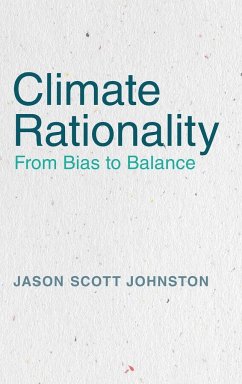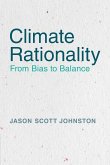Jason Scott Johnston
Climate Rationality
Jason Scott Johnston
Climate Rationality
- Gebundenes Buch
- Merkliste
- Auf die Merkliste
- Bewerten Bewerten
- Teilen
- Produkt teilen
- Produkterinnerung
- Produkterinnerung
Johnston unpacks and critiques the legal, economic, and scientific basis for precautionary climate policies pursued in the United States.
Andere Kunden interessierten sich auch für
![Climate Rationality Climate Rationality]() Jason Scott JohnstonClimate Rationality92,99 €
Jason Scott JohnstonClimate Rationality92,99 €![The International Climate Change Regime The International Climate Change Regime]() Farhana YaminThe International Climate Change Regime258,99 €
Farhana YaminThe International Climate Change Regime258,99 €![Creative (Climate) Communications Creative (Climate) Communications]() Maxwell BoykoffCreative (Climate) Communications38,99 €
Maxwell BoykoffCreative (Climate) Communications38,99 €![Companies and Climate Change Companies and Climate Change]() Lisa BenjaminCompanies and Climate Change115,99 €
Lisa BenjaminCompanies and Climate Change115,99 €![Climate Change Litigation Climate Change Litigation]() Hari M. OsofskyClimate Change Litigation44,99 €
Hari M. OsofskyClimate Change Litigation44,99 €![Climate Change Policy in the European Union Climate Change Policy in the European Union]() Climate Change Policy in the European Union63,99 €
Climate Change Policy in the European Union63,99 €![Climate and Culture Climate and Culture]() Climate and Culture146,99 €
Climate and Culture146,99 €-
-
-
Johnston unpacks and critiques the legal, economic, and scientific basis for precautionary climate policies pursued in the United States.
Hinweis: Dieser Artikel kann nur an eine deutsche Lieferadresse ausgeliefert werden.
Hinweis: Dieser Artikel kann nur an eine deutsche Lieferadresse ausgeliefert werden.
Produktdetails
- Produktdetails
- Verlag: Cambridge University Press
- Seitenzahl: 656
- Erscheinungstermin: 19. August 2021
- Englisch
- Abmessung: 235mm x 157mm x 39mm
- Gewicht: 1086g
- ISBN-13: 9781108415637
- ISBN-10: 1108415636
- Artikelnr.: 61481164
- Herstellerkennzeichnung
- Produktsicherheitsverantwortliche/r
- Europaallee 1
- 36244 Bad Hersfeld
- gpsr@libri.de
- Verlag: Cambridge University Press
- Seitenzahl: 656
- Erscheinungstermin: 19. August 2021
- Englisch
- Abmessung: 235mm x 157mm x 39mm
- Gewicht: 1086g
- ISBN-13: 9781108415637
- ISBN-10: 1108415636
- Artikelnr.: 61481164
- Herstellerkennzeichnung
- Produktsicherheitsverantwortliche/r
- Europaallee 1
- 36244 Bad Hersfeld
- gpsr@libri.de
Jason Scott Johnston is the Henry L. and Grace Doherty Charitable Foundation Professor of Law and Director of the Olin Program in Law and Economics at the University of Virginia Law School. He has been awarded a Bosch Fellowship at the American Academy of Berlin and a Simon Fellowship at the Property and Environment Research Center. Johnston has also served on the Board of the American Law and Economics Association, the Searle Civil Justice Institute, and the Social Science Grant Review Panel of the National Science Foundation. His research has appeared in journals such as the Journal of Law, Economics and Organization and the Yale Law Journal, and he is the editor of the Institutions and Incentives in Regulatory Science (2012).
1. Introduction; Part I. The Costs of Precautionary Policy: 2. The
endangerment game; 3. The precautionary principle: what it does and doesn't
do; 4. EPA's newfound role in regulating automobile mileage; 5. 'It will
bankrupt you' - using environmental regulations to end the mining and use
of coal in the United States; 6. The clean power plan, the rule of law, and
EPA's takeover of state and regional electricity systems; 7. Renewable
power and the reliabilty and cost of electricity; 8. Renewable power
subsidies and mandates: harming today's environment and punishing the poor;
9. Spinning the tort liability roulette wheel; Part II. The Other Side of
the Story: the Structure, Process and Output of Climate Science Assessment
Institutions and the Science they Neglect: 10. But is it true? The case for
taking a critical look at the economic and physical science underlying
estimates of the benefits of ghg emission reduction; 11. 'Born in
politics': the rise of the climate change science production and assessment
complex; 12. Settling science and propagandizing for action: the structure,
process and products of the climate science production complex; 13. Recent
observed climate change in longer term perspective; 14. Beyond co2: causes
of regional climate change that the IPCC has ignored; 15. Projecting future
climate from computer models and far, far distant earth history; 16. The
precautionary social cost of carbon; Part III. Toward Rational Climate
Policy: 17. Adapt and prosper; 18. The surprising sahel; 19. Selected
policy implications.
endangerment game; 3. The precautionary principle: what it does and doesn't
do; 4. EPA's newfound role in regulating automobile mileage; 5. 'It will
bankrupt you' - using environmental regulations to end the mining and use
of coal in the United States; 6. The clean power plan, the rule of law, and
EPA's takeover of state and regional electricity systems; 7. Renewable
power and the reliabilty and cost of electricity; 8. Renewable power
subsidies and mandates: harming today's environment and punishing the poor;
9. Spinning the tort liability roulette wheel; Part II. The Other Side of
the Story: the Structure, Process and Output of Climate Science Assessment
Institutions and the Science they Neglect: 10. But is it true? The case for
taking a critical look at the economic and physical science underlying
estimates of the benefits of ghg emission reduction; 11. 'Born in
politics': the rise of the climate change science production and assessment
complex; 12. Settling science and propagandizing for action: the structure,
process and products of the climate science production complex; 13. Recent
observed climate change in longer term perspective; 14. Beyond co2: causes
of regional climate change that the IPCC has ignored; 15. Projecting future
climate from computer models and far, far distant earth history; 16. The
precautionary social cost of carbon; Part III. Toward Rational Climate
Policy: 17. Adapt and prosper; 18. The surprising sahel; 19. Selected
policy implications.
1. Introduction; Part I. The Costs of Precautionary Policy: 2. The
endangerment game; 3. The precautionary principle: what it does and doesn't
do; 4. EPA's newfound role in regulating automobile mileage; 5. 'It will
bankrupt you' - using environmental regulations to end the mining and use
of coal in the United States; 6. The clean power plan, the rule of law, and
EPA's takeover of state and regional electricity systems; 7. Renewable
power and the reliabilty and cost of electricity; 8. Renewable power
subsidies and mandates: harming today's environment and punishing the poor;
9. Spinning the tort liability roulette wheel; Part II. The Other Side of
the Story: the Structure, Process and Output of Climate Science Assessment
Institutions and the Science they Neglect: 10. But is it true? The case for
taking a critical look at the economic and physical science underlying
estimates of the benefits of ghg emission reduction; 11. 'Born in
politics': the rise of the climate change science production and assessment
complex; 12. Settling science and propagandizing for action: the structure,
process and products of the climate science production complex; 13. Recent
observed climate change in longer term perspective; 14. Beyond co2: causes
of regional climate change that the IPCC has ignored; 15. Projecting future
climate from computer models and far, far distant earth history; 16. The
precautionary social cost of carbon; Part III. Toward Rational Climate
Policy: 17. Adapt and prosper; 18. The surprising sahel; 19. Selected
policy implications.
endangerment game; 3. The precautionary principle: what it does and doesn't
do; 4. EPA's newfound role in regulating automobile mileage; 5. 'It will
bankrupt you' - using environmental regulations to end the mining and use
of coal in the United States; 6. The clean power plan, the rule of law, and
EPA's takeover of state and regional electricity systems; 7. Renewable
power and the reliabilty and cost of electricity; 8. Renewable power
subsidies and mandates: harming today's environment and punishing the poor;
9. Spinning the tort liability roulette wheel; Part II. The Other Side of
the Story: the Structure, Process and Output of Climate Science Assessment
Institutions and the Science they Neglect: 10. But is it true? The case for
taking a critical look at the economic and physical science underlying
estimates of the benefits of ghg emission reduction; 11. 'Born in
politics': the rise of the climate change science production and assessment
complex; 12. Settling science and propagandizing for action: the structure,
process and products of the climate science production complex; 13. Recent
observed climate change in longer term perspective; 14. Beyond co2: causes
of regional climate change that the IPCC has ignored; 15. Projecting future
climate from computer models and far, far distant earth history; 16. The
precautionary social cost of carbon; Part III. Toward Rational Climate
Policy: 17. Adapt and prosper; 18. The surprising sahel; 19. Selected
policy implications.








